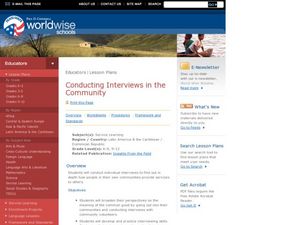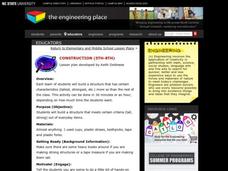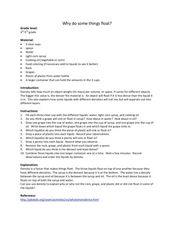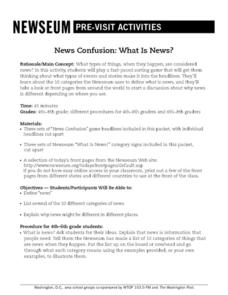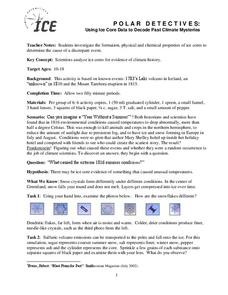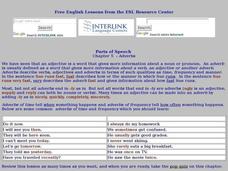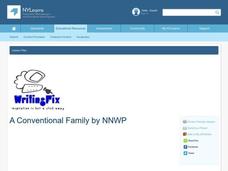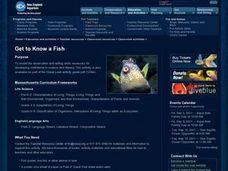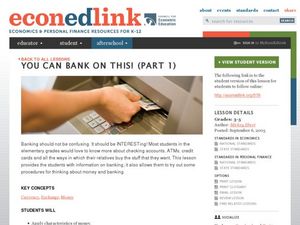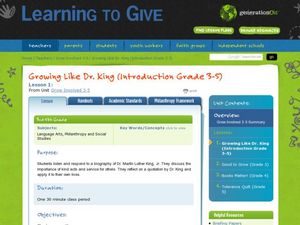EngageNY
Solving Percent Problems
Don't discount how much your pupils understand percents! The 27th lesson in a series of 29 presents a problem to find the cost of a discounted outfit. Small groups determine either the original price or the discount received given the...
Curated OER
Food Pyramid
Here is an engaging cross-curicular lesson which incorporates elements of language arts and heatlh. Groups of learners are assigned to one vowel sound. They work together to find pictures of food out of a booklet that have the long vowel...
Curated OER
Hydrocarbons
Making models is always memorable. In this activity, physical science starters examine the structure of hydrocarbons using marshmallows, raisins, and toothpicks. They even act as atoms themselves and link arms to represent covalent...
Curated OER
Conducting Interviews in the Community
Learners conduct individual interviews to find out how people in their own communities provide services to others. In this interview lesson, students broaden their perspectives on the meaning of the common good by conducting interviews...
North Carolina State University
Construction
Engineering design projects serve as great opportunities for collaborative problem solving. In this case, students work in small groups designing, building, and eventually testing a structure that meets a teacher-specified objective. It...
Federal Reserve Bank
Financial Literacy Infographic Scavenger Hunt
A lesson in personal finance can be the most valuable part of a high school education. Connect the basics of banking with informational reading skills in a lesson that prompts teenagers to answer a series of questions based on an array...
Curated OER
Physical Changes and States of Matter - One
Third graders study the three states of matter and identify the physical changes that take place between them. There is an initial teacher-led demonstration followed by a meaningful whole-class inquiry. These two activities should lead...
Curated OER
Why Do Some Things Float?
Learners recognize that density determines whether objects sink or float. In this sink or float lesson, students experiment with plastic in three liquids. learners drop their objects into the liquids and observe and record their results.
Newseum
News Confusion: What Is News?
Use headlines to help your learners understand what news is. First, present a list of categories to your class. Then instruct small groups to play a game in which they sort headlines into the categories. Discuss the result and examine...
Newseum
Slanted Facts and Slippery Numbers
The Internet is known as the information superhighway, but sometimes it's hard to know when to hit the brakes on unreliable sources. Using a well-rounded lesson plan, pupils read and summarize articles about the gender pay gap and...
Poetry4kids
How to Write a Repetition Poem
A repetition poem is the focus of a lesson that challenges scholars to compose an original piece. To add meaning to their poem, authors choose words to repeat at the start of most lines.
Federal Reserve Bank
FRED in the Classroom: Measures of Inflation
Don't just tell class members about how to measure inflation, have them experience it firsthand by asking them to work with real data and construct graphs!
Polar Trec
Polar Detectives: Using Ice Core Data to Decode Past Climate Mysteries
How does examining an ice core tell us about weather? Learners set up and explore fake ice cores made of sugar, salt, and ash to represent historical snowfall and volcanic eruptions. From their setups, scholars determine what caused the...
Curated OER
Parts of Speech Chapter 5 - Adverbs
In this online interactive adverbs worksheet, students review what adverbs are and how they are used in sentences. Students take a multiple choice pop quiz online in regards to 10 specific questions about adverbs.
Curated OER
Face to Face with the Great Depression
Students develop an analytical perspective of how historians record, preserve, and interpret data. In this US history lesson students read and interpret personal accounts of the Great Depression. They discuss how interpretation affects...
Curated OER
Twentieth Century Entertainment: When Work is Done
Students determine how Americans enjoy leisure time. In this 20th century America instructional activity, students research primary sources to study how Americans gained leisure time during the century and what they did with it.
Curated OER
A Conventional Family
Students explore writing techniques by analyzing their own families. For this family values lesson, students view the film "The Incredibles" in class and discuss the different types of modern-day families. Students write about their...
Curated OER
Get to Know a Fish
Students discover the anatomy of a fish by identifying its body parts. In this oceanography lesson, students view a live fish in their classroom and draw a poster of the fish one body part at a time while identifying it. Students...
Council for Economic Education
You Can BANK On This! (Part 1)
Students investigate the concepts of money management and banking through Internet activities. In this economics lesson plan, students discuss the characteristics of money and how people once bartered with goods instead of paying with...
Curated OER
Decaying Pumpkins
First graders discover life and death even in vegetables as they examine a dead pumpkin. In this plant life activity, 1st graders collect pumpkins after Halloween and examine the differences between a fresh pumpkin and a very old,...
Curated OER
Growing Like Dr. King
Students explore American History by reading biographical material. For this civil rights lesson, students read information about Martin Luther King Jr. and his successful demonstrations which led to equal rights for African Americans....
Curated OER
Exploring Film Genres for Telling Hero Stories: Experimental Shorts
Students design and create an experimental film to express a theme or concept regarding heroism. They establish shots of locations, write dialogue, create montages and subjective footage.
Curated OER
How Do We Know...?
High schoolers identify and explain how various inventions and astronomers have improved our appreciation of the universe. Students identify at least two constellations in the sky and discuss how they were used in ancient times to tell...
Curated OER
Growing Independence and Fluency Lesson: Ready, Set, Read Expressively!
Students practice becoming more fluent readers with fluency by assessing one minute reads and repeated readings. They also practice reading silently and then read the book, "Alexander and the Terrible, Horrible, No Good, Very Bad Day,"...
Other popular searches
- Telling Time Lesson Plans
- Telling Time Lesson Spanish
- Telling Time Lesson French
- Telling Time Lessons Sundial
- Telling Time Lesson +Spanish
- Math Lessons Telling Time





